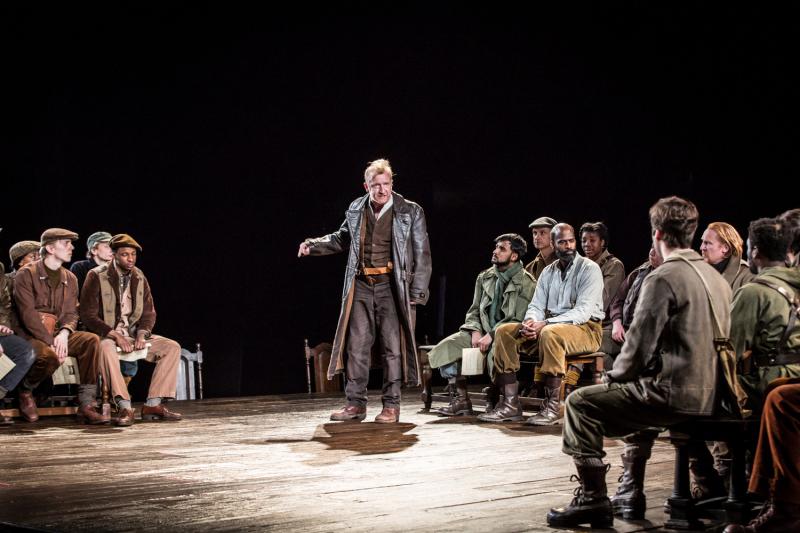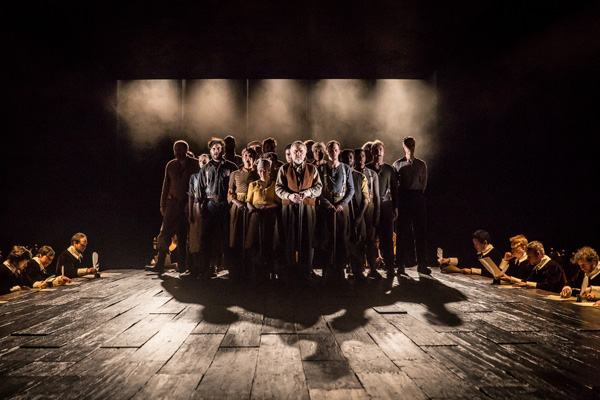Light Shining in Buckinghamshire, National Theatre | reviews, news & interviews
Light Shining in Buckinghamshire, National Theatre
Light Shining in Buckinghamshire, National Theatre
Revival of Caryl Churchill’s 1976 play about radicals in the English Civil War is an acquired taste

The trouble with the general election is that while everybody talks about money, nobody talks about ideas. We know the price of everything, but the value of nothing. This might seem to be a triumphant demonstration of the essential pragmatism of the nation, yet there was a time in English history when ideas mattered. And when they were passionately discussed, and bitterly fought over.
Now revived in a large-scale production by Lyndsey Turner, Light Shining in Buckinghamshire offers a series of snapshots of events during those turbulent years when the English Revolution threatened to turn the world upside down. As civil war destroyed law and order, the sudden absence of authority allowed a huge variety of Levellers, Diggers and Ranters; preachers, agitators and chancers; radical soldiers, poor peasants and wandering beggars, the opportunity to make their voices heard.
The past, however strange, can
still speak to us
Instead of showing the battles of the great and the good, Churchill focuses on all the people that lived, struggled and fought in the wings. As such, the play deals a body blow to the idea that the civil war was just about Cavaliers and Roundheads, and shows history from the point of view of the underdogs, for whom events were as much about class war as about bringing down the monarchy.
There are two highpoints: during the great Putney Debates of 1647, the low-class political radicals took on their masters and commanders in a discussion about voting rights and social justice, with the Levellers arguing in favour of universal manhood suffrage while army leaders such as Oliver Cromwell and Henry Ireton supported the status quo. As the theme of a revolution betrayed unwinds – and Cromwell, onetime revolutionary soldier, turns into the imperialist grandee who subjugates Ireland – the play sympathises with the grassroots idealists, such as Rainborough, Sexby and Wildman.
The second highpoint is when the Diggers, led by Gerald Winstanley, occupy St George’s Hill near Weybridge with the intention of owning property in common and working together on the soil. Such scenes are a timely reminder that some traditions can be resonant, and that, however strange, the past can still speak to us today. This communitarian aspect is helped by the fact that the play’s multiracial cast is joined by members of the National Theatre’s Community Company, who fill the stage with their songs and hymns.
Since, from a Marxist perspective, the 17th century marks not only the origins of capitalist work discipline but also sexual repression, Churchill carefully gives some of her female characters a feminist voice. The concentration on the underdog results in a riot of ideas, expressed in the religious jargon of the time, and a glorious feeling of what it must have been like to live during a time of rapid social and political change: from angry clashes with sanctimonious piety to millenarian fantasies that crash into bitter disillusionment.
 But beware. If you don’t already know the difference between Seekers and Shakers – or have a pretty good grasp of 17th-century history – this play is liable to go well over your head. The production’s eclectic mix of costumes suggests a long heritage, one that animated the late Tony Benn and inspires the current Billy Bragg. It is also worth pointing out that the 17th-century Freeborn Englishman (the Scots, Welsh and Irish don’t get a look in) now comes across as atrociously insular, xenophobic and obsessed with God.
But beware. If you don’t already know the difference between Seekers and Shakers – or have a pretty good grasp of 17th-century history – this play is liable to go well over your head. The production’s eclectic mix of costumes suggests a long heritage, one that animated the late Tony Benn and inspires the current Billy Bragg. It is also worth pointing out that the 17th-century Freeborn Englishman (the Scots, Welsh and Irish don’t get a look in) now comes across as atrociously insular, xenophobic and obsessed with God.
Turner’s staging, beautifully designed by Es Devlin, features an enormous oak table, at which the rich gentry and churchmen feast at the start of the play but are usurped by parliamentarian lawyers and scribes by the end (the privileged winners writing history). From a huge cast (pictured above), I liked Sargon Yelda (Rainborough), Steffan Rhodri (Sexby), Daniel Flynn (Cromwell), Leo Bill (Ireton), Joshua James and Trystan Gravelle. Alan Williams plays a variety of down and outs. Elizabeth Chan and Ann Ogbomo suffer the agonies of poverty. This drama of ideas also, occasionally, engages the emotions.
rating
Buy
Share this article
Add comment
The future of Arts Journalism
You can stop theartsdesk.com closing!
We urgently need financing to survive. Our fundraising drive has thus far raised £49,000 but we need to reach £100,000 or we will be forced to close. Please contribute here: https://gofund.me/c3f6033d
And if you can forward this information to anyone who might assist, we’d be grateful.

Subscribe to theartsdesk.com
Thank you for continuing to read our work on theartsdesk.com. For unlimited access to every article in its entirety, including our archive of more than 15,000 pieces, we're asking for £5 per month or £40 per year. We feel it's a very good deal, and hope you do too.
To take a subscription now simply click here.
And if you're looking for that extra gift for a friend or family member, why not treat them to a theartsdesk.com gift subscription?
more Theatre
 Othello, Theatre Royal, Haymarket review - a surprising mix of stateliness and ironic humour
David Harewood and Toby Jones at odds
Othello, Theatre Royal, Haymarket review - a surprising mix of stateliness and ironic humour
David Harewood and Toby Jones at odds
 Macbeth, RSC, Stratford review - Glaswegian gangs and ghoulies prove gripping
Sam Heughan's Macbeth cannot quite find a home in a mobster pub
Macbeth, RSC, Stratford review - Glaswegian gangs and ghoulies prove gripping
Sam Heughan's Macbeth cannot quite find a home in a mobster pub
 The Line of Beauty, Almeida Theatre review - the 80s revisited in theatrically ravishing form
Alan Hollinghurst novel is cunningly filleted, very finely acted
The Line of Beauty, Almeida Theatre review - the 80s revisited in theatrically ravishing form
Alan Hollinghurst novel is cunningly filleted, very finely acted
 Wendy & Peter Pan, Barbican Theatre review - mixed bag of panto and comic play, turned up to 11
The RSC adaptation is aimed at children, though all will thrill to its spectacle
Wendy & Peter Pan, Barbican Theatre review - mixed bag of panto and comic play, turned up to 11
The RSC adaptation is aimed at children, though all will thrill to its spectacle
 Hedda, Orange Tree Theatre review - a monument reimagined, perhaps even improved
Scandinavian masterpiece transplanted into a London reeling from the ravages of war
Hedda, Orange Tree Theatre review - a monument reimagined, perhaps even improved
Scandinavian masterpiece transplanted into a London reeling from the ravages of war
 The Assembled Parties, Hampstead review - a rarity, a well-made play delivered straight
Witty but poignant tribute to the strength of family ties as all around disintegrates
The Assembled Parties, Hampstead review - a rarity, a well-made play delivered straight
Witty but poignant tribute to the strength of family ties as all around disintegrates
 Mary Page Marlowe, Old Vic review - a starry portrait of a splintered life
Tracy Letts's Off Broadway play makes a shimmeringly powerful London debut
Mary Page Marlowe, Old Vic review - a starry portrait of a splintered life
Tracy Letts's Off Broadway play makes a shimmeringly powerful London debut
 Little Brother, Soho Theatre review - light, bright but emotionally true
This Verity Bargate Award-winning dramedy is entertaining as well as thought provoking
Little Brother, Soho Theatre review - light, bright but emotionally true
This Verity Bargate Award-winning dramedy is entertaining as well as thought provoking
 The Unbelievers, Royal Court Theatre - grimly compelling, powerfully performed
Nick Payne's new play is amongst his best
The Unbelievers, Royal Court Theatre - grimly compelling, powerfully performed
Nick Payne's new play is amongst his best
 The Maids, Donmar Warehouse review - vibrant cast lost in a spectacular-looking fever dream
Kip Williams revises Genet, with little gained in the update except eye-popping visuals
The Maids, Donmar Warehouse review - vibrant cast lost in a spectacular-looking fever dream
Kip Williams revises Genet, with little gained in the update except eye-popping visuals
 Ragdoll, Jermyn Street Theatre review - compelling and emotionally truthful
Katherine Moar returns with a Patty Hearst-inspired follow up to her debut hit 'Farm Hall'
Ragdoll, Jermyn Street Theatre review - compelling and emotionally truthful
Katherine Moar returns with a Patty Hearst-inspired follow up to her debut hit 'Farm Hall'
 Troilus and Cressida, Globe Theatre review - a 'problem play' with added problems
Raucous and carnivalesque, but also ugly and incomprehensible
Troilus and Cressida, Globe Theatre review - a 'problem play' with added problems
Raucous and carnivalesque, but also ugly and incomprehensible

Comments
This is comfortably the worst
It seems to me over the last
I am middle aged, middle
I agree... an utterly tedious
The dullest play I've ever